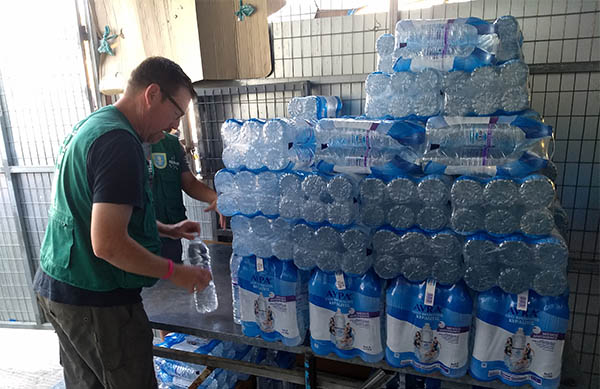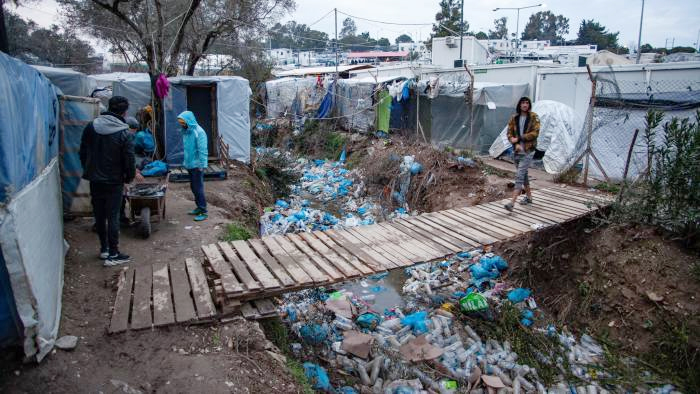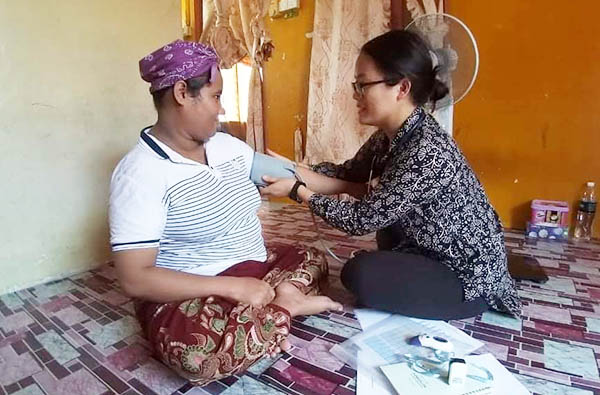 WHAT COMMUNITY DEVELOPMENT LOOKS LIKE IN 2020
WHAT COMMUNITY DEVELOPMENT LOOKS LIKE IN 2020
Relief work is helping people when they can’t help themselves. Community development (CD) is helping people help themselves. We believe there is a need to respond to both.
At times, we demonstrate the love of Jesus by providing services that are absolutely needed now. Providing food, water and medical help after a natural disaster, or serving in a refugee camp are examples.
However, we want to ask ourselves, how can we do relief work in such a way that it helps pave the way for development work to come afterwards, in a way that builds relationships rather than dependency? For example, instead of handing out food in a pandemic-stricken country, we come alongside the local church and help them build bridges to people in need.
When we go into a refugee camp, we don’t just hand out food and blankets, but we talk to the refugees to understand what their real needs are. At the Moria refugee camp in Greece, our team heard the felt-needs expressed by women. They didn’t feel safe going to the bathrooms at night, and they didn’t have a hygienic alternative. There was a desire to do something about it, a discussion of possible solutions, one option was tested and picked by the women, and then they shared it with other women.
“The community had to have buy in,” said Martin Harrison, a Reach Beyond missionary from the UK with a global emphasis on community development. Martin led the team that provided she-wee urination devices to the women in the camp. “We weren’t just giving something out, but we were improving sanitation.”
Over the years, Reach Beyond has sought out ways to not only proclaim the Good News of the Gospel, but also demonstrate the love of Christ. In everything we do, we want to include both proclamation (Voice) and demonstration (Hands). We train our partner radio stations in both “on-air” and “off-air” ministry, encouraging them to come alongside the community to answer felt-needs. And when we do CD and medical ministry, we address both the physical and spiritual needs.
“We wouldn’t install a well and leave our Bibles at home,” says Wim de Groen, director of the FastTrack training program. “We have two toolboxes: the technical one, but also the spiritual. We have to be ready to bring both to the job.”
A LEGACY OF SERVING THROUGH COMMUNITY DEVELOPMENT
The 1949 Ambato Earthquake struck Ecuador’s Tungurahua Province killing some 6,000 people and leaving another 10,000 people homeless. Reach Beyond (then HCJB) had just started its medical ministry and quickly joined relief efforts, responding to a request from Ecuador’s President to help with radio communications. The mission also sent its medical staff and helped build some temporary housing. In the following decade, HCJB’s medical ministries would expand to include clinics and hospitals as well as mobile medical caravans that demonstrated the love of Jesus. But it wasn’t until 1978 that we officially established a community development ministry to design and help communities build clean water projects. The CD department grew to include rural health promoter training and clinical investigations into treating diseases like river blindness.
“The time spent working in CD in Ecuador led to what we do now,” says Martin. “With the number of people who came through Ecuador and received training in CD, we were essentially running an apprenticeship program for years. Those people have gone out all across the world with Reach Beyond and other organizations. What started in Ecuador has served as a launch pad for community development in other parts of the world.”
Because CD involves coming alongside a community to identify solutions for felt-needs, the work can look different from year-to-year. In a year with a global pandemic, for example, projects may be more focused on meeting immediate and urgent needs. But even with the pandemic, there are a number of CD projects still planned for 2020.
 THE REDEMPTION STORY AS TRASH TO TREASURE
THE REDEMPTION STORY AS TRASH TO TREASURE
In 2019, a door opened for Reach Beyond to help with the refugee crisis in Greece. We came alongside our local partner to help with food distribution in the Moria refugee camp on the island of Lesbos, but we knew we wanted to do more. When engineer and Reach Beyond missionary Bill Cheung joined a short-term team, he not only went to serve, but also to identify ways we could provide CD support.
“One of the things I noticed was a creek just full of plastic bottles. As part of the food and water distribution, approximately 18 pallets of bottled water were handed out each day,” said Bill. “That is more than 9,000 bottles a day, and when people were done with them, they threw them in the ravine.
While in the camp, he met a Brazilian architect who was teaching refugees how to re-use the wooden pallets used to ship the water and build them into benches and chairs.
“He explained that the hands-on process of working with discarded wood showed a transformation of something from trash to treasure. It was such a clear example of the transformational power of God, and it was an example of redemption that could be used to share the Gospel in the future,” said Bill. “It made me think, there’s got to be a way to take these bottles and make something useful.”
Bill researched and found a company, Precious Plastic, that provides free plans for low-cost, low-tech recycling machines. The machines start by shredding plastic into pellets, which can then be heated into moldable material. It can then go through a molding or extrusion process to create useful items, like water basins and utensils, or construction material, like post beams and tiles.
The project also has micro-finance possibilities. “Boredom and the lack of opportunities have been identified as serious problems in the Moria camp and other locations. Refugees do not have permission to work on the island of Lesbos for an income,” said Bill. “We still have some work to do to investigate the possibilities of a micro-enterprise model, but you can make anything out of the plastic. It’s up to your imagination.”
Rather than jumping straight to the field, the “Trash to Treasure” program will first be piloted in Spain to learn the potential challenges, perfect the processes and train volunteers. The equipment has been ordered, but travel restrictions have placed a temporary hold on the process. Once restrictions lift, the goal is to complete the pilot phase this year, and then take the project to Moria and other areas where we do ministry.
“It’s not just something for refugee camps or urban areas. Even in African villages, we’ve seen bottles – Coke and water bottles – brought in for the village, but nobody ever comes to take the plastic back out. This could give the villages something to do with the plastic, which then can become a commodity.”
The project also offers mentoring and mobilization opportunities. From the collection of plastic materials, to the design, construction and operation of the recycling facilities, to the decisions as to what end products should be made at each field location, both local volunteers and short-term teams can be utilized. Involvement of local volunteers, including the unchurched, will develop relationships as people work together to solve problems. This will naturally lead to a platform for sharing faith.
TRAINING WOMEN TO LEAD CLEAN WATER PROJECTS
Water projects are still a big part of our CD program as we continue to come alongside partner organizations, indigenous churches and radio stations to help meet the critical water needs of unreached people. According to the World Health Organization, at least 2 billion people globally use a contaminated drinking water source. In least-developed countries, 22% of health care facilities have no water or sanitation service. It is estimated that by 2025, half of the world’s population will be living in water-stressed areas.
Clean water is vital to public health. Improved water supply and sanitation can eliminate diseases, extend life expectancy, improve food supply, boost economic growth and contribute greatly to poverty reduction. And not only do we have the resources to help provide clean water, but we can also share the source of Living Water.
In a Southeast Asian country, one of our partners identified a village where people were getting sick from their water source. They believed it was due to too high salt content, and the villagers were afraid of arsenic poisoning, so Wim took a team from Ecuador to look at the situation.
They studied the problem from all angles including social, economic and physical impact. They determined salt levels weren't the heart of the problem. It was the villager's lack of proper training to take care of their water, especially in their water storage, which was causing a bacterial issue. They wanted a big installation, but Wim’s experience told him that wouldn’t be very safe or effective.
“Each family needed to take care of their own water source and keep it clean,” Wim said. “Instead of an expensive big installation, they just needed a filter and training.”
He suggested they take 10 families, and train one woman from each family on how to use a rain collection water tank and filter. They would get the parts to set up and run it, and then those 10 women could go and train the next class.
It’s a project that can have a big impact on the health of the community, as well as the self-worth of the women they will be training. “As soon as travel restrictions lift, we are ready to implement it,” said Wim.
 PROVIDING SUPPORT TO UNREACHED WOMEN
PROVIDING SUPPORT TO UNREACHED WOMEN
In another Southeast Asian country, many young women from one unreached people group, ages 15-20, are teenage brides who are expecting. They do not have their moms or family members for support. They are illiterate, uneducated, and do not have access to medical care.
When Rachel joined Reach Beyond’s Asia Pacific team as a new missionary earlier this year, she brought a much-needed skill: she is a nurse. The team asked Rachel to put together a program that would address the perinatal education needs of these young women.
Rachel designed a program that would include seven home visits, including six before birth, and at least one after. Topics covered would include nutrition, normal versus abnormal symptoms, childbirth, postpartum care, breastfeeding and newborn care. She would track vital signs and provide education and support that these young moms wouldn’t otherwise have. Rachel is looking at incentives that would keep a woman engaged in the program, including well baby kits, or possibly helping with hospital bills.
“We want to meet them where they are and allow them to ask questions that might be taboo in their culture, but that can help them have a healthy birth. We want to share life with them, provide support and build lasting relationships,” said Rachel.
Rachel is currently testing the program with a young mom, whom she hopes could become a translator. “The girls are illiterate, don’t speak English and barely speak the local language here. They don’t know basic medical terms, even in their own language, so creating a curriculum that overcomes these obstacles has been a challenge.”
Another challenge is visas. There is a list of girls ready to join the program, but Rachel doesn’t know how long she will be able to stay in the region. Pray that all visa issues will be resolved and that this program would move forward this year. Pray that it would be a blessing to these young moms.
“Our goal is to help 20 women a year. The girls are there. We just need workers and funding,” says Rachel.
As it turns out, perinatal work isn’t the only program Rachel is looking to launch. Although art is just a hobby for Rachel, there is an opportunity to launch an art therapy and music therapy program with the refugee schools.
These unreached people have been through so much, fleeing genocide in their home country, and struggling to find a home anywhere else. Art and music therapy could go a long way in addressing the trauma that these kids have faced.
“God has used my hobbies just as much as my career,” says Rachel. “The opportunities are endless.”
|
GIVE:
PRAY: |
